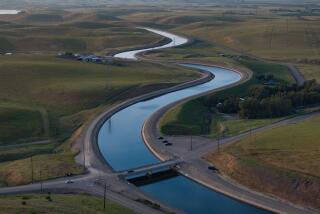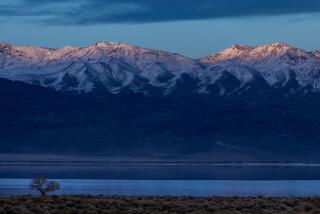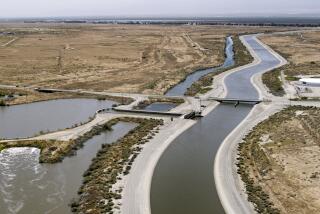State Will Cut Off Aqueduct Water to L.A. : Drought: Action is temporary, but officials warn that it could be an ominous sign. MWD says area reservoir supplies should be adequate.
SACRAMENTO — With lakes and reservoirs in the north continuing to drop as drought conditions persist, state officials moved Tuesday to temporarily shut down the huge Edmonston pumps that lift water over the Tehachapis into the Los Angeles Basin.
While insisting that the move would have no immediate effect on the Metropolitan Water District and its Southern California customers, officials acknowledged that it could be an ominous prelude to things to come.
Carl Boronkay, MWD’s general manager, said the move was “a bit of a surprise” and may prompt him to recommend more severe cutbacks in water deliveries than those approved by the district’s board.
MWD serves 15 million Southern California residents and 27 local agencies, including the city of Los Angeles, and depends on the state water system for about three-fourths of its supplies.
“At this point, we think the state reservoirs in Southern California will be enough to continue our needs,” Boronkay said. “But we’re looking from week to week at the state situation and we may have to move to a higher phase or a greater cut in our deliveries sooner than we anticipated. This kind of gets our attention.”
In the first mandatory water rationing imposed since 1977, the district last week ordered cutbacks in deliveries averaging 10%, effective Feb. 1, for agencies that MWD serves. Boronkay said he may propose cutbacks averaging 17% to be put in effect on that date “if the water situation hasn’t improved.”
“This is just another underscoring of the terribly bad weather we’re having,” he said.
Lawrence Mullnix, deputy director of the state Department of Water Resources, said that because major storms that usually replenish the northern lakes and reservoirs have failed to materialize, officials decided to expedite a shutdown of the Edmonston pumps. The pumps are shut down periodically for maintenance, but not at this time of year. He said the shutdown would begin today and last “a week or so.”
“I don’t think there should be mass hysteria about this; it’s just one of the signs we are experiencing rough times,” Mullnix said. “I think people ought to be put on notice though that if the lack of precipitation continues in Northern California, we’re going to be in very, very serious straits.”
He said the pumps were being shut down while the state cuts back releases from the badly depleted Lake Oroville reservoir on Feather River. He said the reservoir, which normally holds 2 million acre-feet at this time of year, now has about 1 million acre-feet. An acre-foot is about 326,000 gallons, or enough water to meet the needs of two typical homes for a year.
Water released from Lake Oroville flows into the Sacramento-San Joaquin Delta, along with water from other tributaries. From there it is pumped into the California Aqueduct and carried south to four reservoirs: Pyramid Lake, Castaic Lake, Silverwood Lake and Lake Perris. Boronkay said the district will draw on those reservoirs while the pumps are shut.
“There is still quite a bit of storage south of the Delta, or we wouldn’t make this move,” Mullnix said.
He said an additional factor that prompted the move has been cold weather in the Northwest that has caused cutbacks in the availability of electric power usually purchased at this time of year.
Mullnix said that while snow is expected in several weeks, it does not appear that there will be major rainstorms. If rain does move in, he said the pumps could be reactivated quickly.
Officials have said repeatedly that sudden heavy rains and snows could change the water picture dramatically and reduce the need for cutbacks and rationing.
In the meantime, said Mullnix, “(the shutdown) does mean we’re starting to tighten our belt.”
More to Read
Sign up for Essential California
The most important California stories and recommendations in your inbox every morning.
You may occasionally receive promotional content from the Los Angeles Times.









